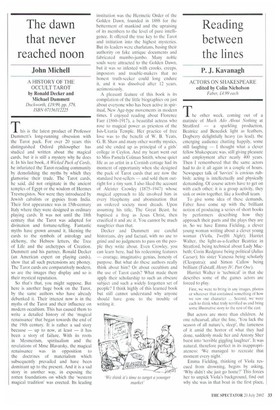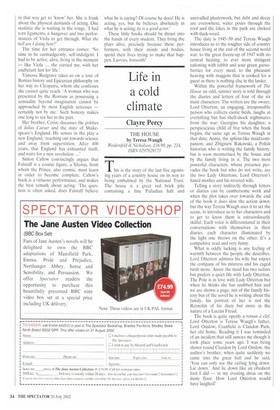Reading between the lines
P. J. Kavanagh
ACTORS ON SHAKESPEARE edited by Cohn Nicholson Faber, £4,99 each The other week, coming out of a matinee of Much Ado About Nothing at Stratford — a sparkling production, Beatrice and Benedick light as feathers, Dogberry delightfully heavy (as lead), the emerging audience chatting happily, some still laughing — I thought what a clever fellow Shakespeare was, still giving pleasure and employment after nearly 400 years. Then I remembered that the same actors had to do it all again in a couple of hours. Newspaper talk of luvvies' is envious rubbish: acting is intellectually and physically demanding. Of course actors have to get on with each other; it is a group activity, they sink or swim together, like a football team.
To give some idea of these demands, Faber have come up with the brilliant notion of producing a series of short books by performers describing how they approach their parts and the plays they are in. So we have Emma Fielding, a clever young woman writing about a clever young woman (Viola, Twelfth Night); Harriet Walter, the light-as-a-feather Beatrice in Stratford, being technical about Lady Macbeth; Corin Redgrave being political (Julius Caesar); his sister Vanessa being scholarly (Cleopatra); and Simon Callow being brilliant (Falstaff, Henry IV, Part One).
Harriet Walter is 'technical' in that she describes some of the games actors are forced to play.
First, we were to bring in any images, photos or whatever that contained something of how we saw our character ... Second, we were each to think what truly terrified us and bring some illustrative story to the rest of the cast.
But actors are more than children. At one rehearsal, after the line, You lack the season of all nature's, sleep', the lameness of it amid the horror of what they had done, suddenly made her and Antony Sher burst into 'terrible giggling laughter'. It was natural, therefore perfect in its inappropriateness: 'We managed to recreate that moment every night.'
Emma Fielding, thinking of Viola rescued from drowning, begins by asking, 'Why didn't she just go home?' This forces her to unpick Viola's background, find out why she was in that boat in the first place, in that way get to 'know' her. She is frank about the physical demands of acting. One matinee she is waiting in the wings. had torn ligaments, a hangover and two performances of Viola to get through. What the hell am I doing here?'
The time for her entrance comes: 'No time to be curmudgeonly, self-indulgent. I had to be active, alive, living in the moment — like Viola ... she carried me, with her exuberant lust for life.'
Vanessa Redgrave takes us on a tour of Roman history and Epicurean philosophy on her way to Cleopatra, whom she confesses she cannot quite reach. 'A woman who was presented by the Romans as possessing a sensuality beyond imagination cannot be approached by most English actresses — certainly not by me.' Such honesty makes one long to see her in the part.
Her brother, Corin, discusses the politics of Julius Caesar and the state of Shakespeare's England. He senses in the play a new England, 'reaching out towards science and away from superstition. After 400 years, that England has exhausted itself, and waits for a new revolution ...'
Simon Callow convincingly argues that Falstaff is a cosmic figure, a Silenus, from whom the Prince, also cosmic, must learn in order to become complete. Callow's book is a virtuoso performance, and makes the best remark about acting: 'The question is often asked, does Falstaff believe what he is saying? Of course he does! He is acting, yes, but he believes absolutely in what he is acting; he is a good actor.'
These little books should be thrust into the hands of every student. They bring the plays alive, precisely because these performers, with their minds and bodies, spend their lives trying to make that happen. Luvvies, forsooth!



























































 Previous page
Previous page